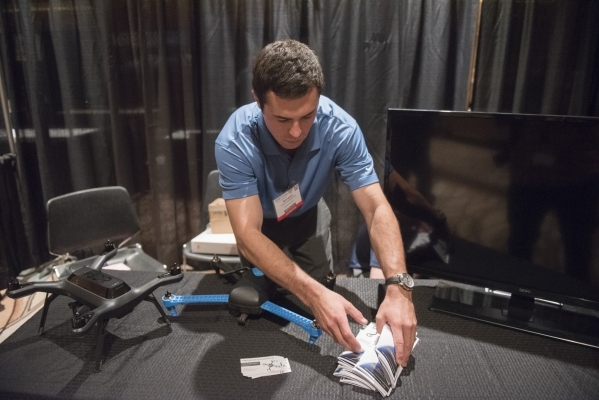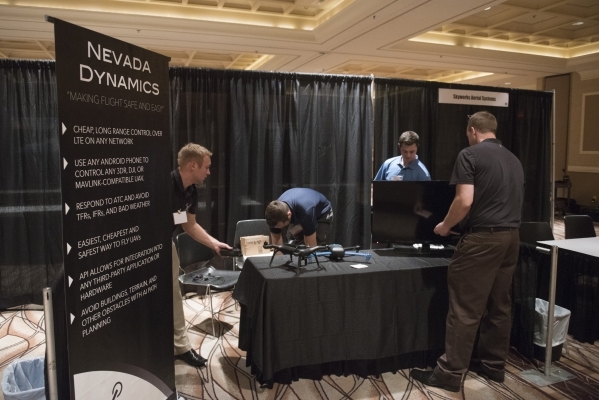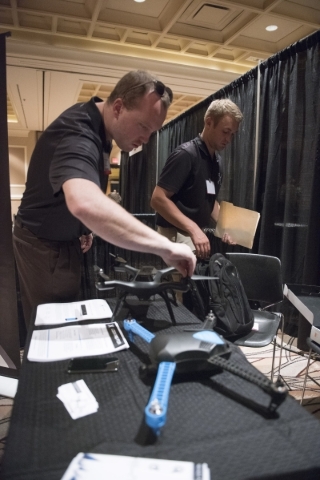Drone enthusiasts warned of government overregulation
Drone enthusiasts were advised to do a better job of explaining the benefits of unmanned aerial systems or local, state and federal government agencies will overregulate them and unintentionally cripple a new technology in which the United States is already behind.
Romeo Durscher, director of education for DJI, a Chinese technology company based in Shenzhen, called 2015 "the year of the drone" and told people attending InterDrone 2015 that highly publicized close calls between unmanned craft and commercial airliners have cast the industry in a negative light.
Durscher spoke at one of the opening sessions of the three-day International Drone Conference and Exhibition that opened Wednesday at the Rio.
More than 3,000 drone builders, fliers and buyers are participating in 104 classes, panels and informational sessions at the event. A trade show featuring a wide variety of unmanned aircraft will be displayed and demonstrated when the floor opens Thursday.
Attendees and exhibitors from all 50 states and 46 countries are attending the event, billed as the largest gathering of unmanned system enthusiasts in history.
The event also will feature the InterDrone Film Festival showing videos taken from drones, a "Yes-Fly Zone" for flight demonstrations, "The Hangar," a separate hall for start-up businesses that use drones, and "The Bench," a collection of attorneys who specialize in answering legal questions in the rapidly evolving industry.
The exhibit hall is open to the public, with registration passes costing $125.
Two Nevadans among presenters
Many of the sessions are technical in nature with courses in writing code and computerized flight plans. But others are more about policy with debates on the regulatory environment, the Federal Aviation Administration's role in integrating drones into the public airspace and privacy concerns.
Two Nevadans are among the event's presenters. Tom Wilczek, industry specialist in aerospace and defense with the Governor's Office on Economic Development, will participate in three sessions on the state's role as a testing facility for unmanned systems.
Ron Futrell, media manager for Las Vegas-based ArrowData, will moderate a panel on the use of drones in journalism — called "dronalism."
Among the Wednesday presentations was Durscher's "year of the drone" kickoff.
He said since Aug. 1 there have been more than 70 reported sightings of drones from aircraft by pilots — although Durscher is not convinced that pilots actually saw drones when they made their reports.
He said those reports have colored the perception the public has of drones and that if the industry is going to progress, it will have to change those perceptions.
In a January survey conducted by French market research company Ipsos, 73 percent of Americans believe consumer drones should be regulated. The survey also said 64 percent of people wouldn't want their next-door neighbor to fly a drone in their backyard, but that 68 percent approve of police using drones to help solve crimes.
While 49 percent said they believe it's all right for people to use drones to monitor their children, 46 percent said they wouldn't want the news media to use drones to enhance their coverage of events.
Fly over public property?
Durscher said a key question was the perception of whether drones should be allowed to fly over private property, and 71 percent said they shouldn't, even though much of the commerce envisioned for the drone industry would involve flying over private property — for property and facility inspections, for police patrols and for agricultural uses.
"Some of the perceptions involve the owner and user," Durscher said. "Most people don't buy a drone, go to the nearest airport and say, 'I'm going to go scare the heck out of a pilot.'"
He encouraged industry professionals to become active in community drone debates and to highlight the good things the autonomous flying vehicles can do. He also suggested educating new pilots and customers about drone regulations at every opportunity and to assist in movements to get drone hardware and software into classrooms.
"It's clear we need to change public perception and advocate on behalf of the industry," he said. "We also have to work with city and state government as well as the federal government. The laws and regulations that are being passed by city councils and state legislators will slow the development of the technology and set us back even further behind the rest of the world."
Contact reporter Richard N. Velotta at rvelotta@reviewjournal.com or 702-477-3893. Find @RickVelotta on Twitter.



























